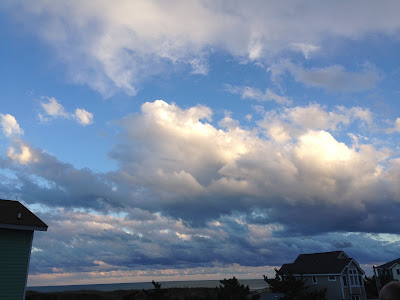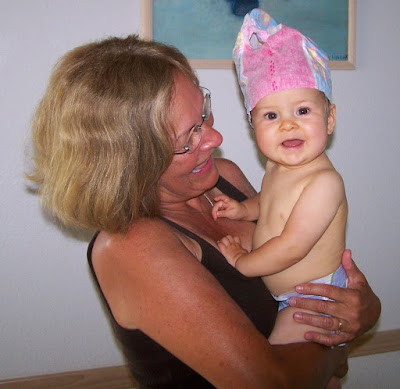Growing Up Evangelical: Preparing for the Apocalypse (at age 10)
 |
| Uh oh. |
My son experienced night terrors when he was a child, and for several years at bedtime he faced his potential disturbances with prayers asking Jesus to keep him from dreams, good or bad. These prayers, by the way, replaced one he began praying at age three, asking Jesus to help him "not choke Jesse." Jesse was the puppy this child liked to carry around by the neck.
One of my own childhood prayers, repeated at bedtime each night, was a plea for Jesus not to come back today and if possible not at all. Over time the prayer became a chant-- a hopeful antidote to the terror inspired, I suppose, by too many sermons on Revelation. Having a well-oiled imagination, pictures of beasts, sulfur fires, bloody moons and killer stars were not hard for me to conjure. Each encounter with biblical passages describing the end of the world fed my understanding that The Second Coming was an event that had enough power to scare folks to death and then bring them back to life. I didn't know which would be scarier.
Raised in an evangelical home, I wasn't afraid of monsters under my bed. Whatever could fit under a bed was incomparable to creatures that leapt from the pages of Revelation, including human-faced locusts and enormous, fire-hurtling angels--specters that lurked behind my daytime thoughts and nighttime dreams.
End Times images didn't seem to be a problem for anyone else I knew. My parents talked freely about Jesus' return and prayed often that he would come back soon, probably to be relieved of the burden of parenting people like me. Cold War anxieties likely contributed to a collective urgency among those who listened to the nightly news and anticipated a conflict with Russia and possible prelude to The Great Tribulation.
As believers prepared to leave the planet, they made various attempts to warn unbelieving neighbors. My dad's friend pasted a plaque to his car's dashboard that read, "WARNING: IN CASE OF RAPTURE, THE DRIVER WILL DISAPPEAR." Though Larry Norman had not yet released his famous "I Wish We'd All Been Ready," soloists in my church sang about "the great judgment morning" and "the weeping and wailing of the lost" who prayed, "but their prayer was too late." Entire congregations sang Second Coming songs, like "Christ Returneth," reminding us that The Second Coming could happen at any minute--morning, noon or night-- and all "in a blaze" that would rip open the sky and roll it up. Even though I sang along, Second Coming songs gave me the shivers.
My parents did their best to walk me through Jesus' return when my fright finally reached a pitch, insisting that I needn't be afraid: "It's our great hope," they pleaded. "It's too scary!" I wailed. Assuming that my worry had to do with being left behind, they assured me that we'd all be going up together. That didn't help because I didn't want to go at all. Being "caught up" was the worst of my fears and didn't seem to me an experience anyone in their right mind would ever look forward to.
Dad suggested I read Revelation for a saner understanding of Second Coming matters. I got as far as Behold he cometh with the clouds! and my fears immediately leached from nighttime hours into daylight consciousness. Like most children, I was a literalist and thought the text meant that the white clouds above my head (which I had only recently learned were not made of cotton) hid the hosts of heaven that were even now poised to sound the blast signaling the great snatch. Though I believed in The Resurrection of the Dead, I was not eager to witness the event. At. All. Probably because of the scary movies I watched with Dad on Saturday nights.
Of course I am convinced that neither Jesus nor the Bible nor even my parents meant for me to worry so much about end-of-the-world details when I was 10 and trying to get a handle on long division. And why, incidentally, information on sex was so restrictive and eschatological details so blatant, I'll never understand. I've often wondered why some of the sermons I listened to didn't come with a warning or rating to protect the innocent. You'd better believe there would have been warnings if any preacher decided to preach on the facts of life.
While no mental effort on my part--not even daydreaming--succeeded in distracting me from the pulpit in those days, I did develop at least one coping strategy. Understanding that Jesus would return like a thief in the night (1 Thessalonians 5:2) when we least expected him (Luke 12:40), I kept his return in mind at all times. When you least expect it, I reasoned, expect it. And of course I also prayed against it.
Mercifully, my fears lessened as I gained some capacity to think abstractly and metaphorically as daily life began to dish up other terrifying realities to worry about, realities like geometry and algebra. Some of the scarier gospel stories I decided to ignore until later, including Jesus' parable about the two in the field and the two in bed, two of which were taken and the other two left behind. My prayers for a delayed rapture, as a result, occurred less often--maybe only four or five times a week. Yet while encounters of the end kind troubled me less, I still carried into my teen years a conscious, uncomfortable dread of things to come. I've never compartmentalized well.
Sometime in the spring of my sophomore year of high school I had a dream that finally met my End Times dis-ease. In this dream I was alone, lying beneath a black, starless sky-- the absolute worst-case context I could imagine for an apocalypse to occur--and knew that The Rapture was on it's way. But just as I was about to freak, a voice, comforting and familiar, spoke in the darkness: Let not your heart be troubled, it said; ye believe in God, believe also in me…I will come again, and receive you unto myself; that where I am, there ye may be also. Straight from the King James Version of John 14 for sure--verses I had learned during any one of my 800+ hours spent in Sunday school, but words that now found a place in my soul to land. The voice did not come as trumpet blast or loud shout, but a quiet urging, as heaven urges all listeners, to resist fear that makes listening impossible. As I opened my heart to the voice, stars appeared but stayed put. I felt myself, in Zephaniah's (1) words, quieted by Love.
From time to time I wonder if the reason we're still pounding out history here on earth has to do with the fact that I had begged Jesus so often to stay in heaven. If this is true--if his decision to tarry (2) is in response to my many vain repetitions--I am profoundly sorry and want it to be clear that I no longer pray that prayer. Since adult responsibilities moved in--responsibilities like paying taxes and balancing my check book--I have more than The Unknown to worry about. It's been years, by the way, since Unknown and I agreed not to become overly involved with each other, and to date we're pretty much keeping our promise.
The subject of death of course falls into the category of The Unknown, and has on occasion outstripped worries about The Second Coming. It occurred to me sometime in my 30's that those who get to be raptured also get to escape death. Not a bad deal, I thought. That was until I realized that something has to happen to our flesh: flesh and blood cannot enter the kingdom and we shall not all sleep, but we shall all be changed, I read. So the metaphysical and the daily have just had to learn to get along.
The main reason I'm not praying against the Second Coming or The Rapture anymore, however, is because I am coming to know Jesus for myself. Maybe the dream helped, but at some point I finally tired of being afraid and stopped running. Dad was right to invite me to read (though maybe not Revelation at age 10); he knew that it's best to come to know the person who is returning and not just the events leading up to the Second Coming. The gospels should be read, if not first, at least alongside Revelation.
Though I still at times feel small and terrified when I see Jesus, bright and powerful in Revelation, his great love is at work in me. There is no fear in love, says John, and love has been the best antidote to my Second Coming terrors.
Maybe because we're once again in an election year and hearing Armageddon language even from politicians who may never have read Revelation, I think this is as good a time as any to pray with early church believers who had only recently waved goodbye to their beloved Jesus (3). Maranatha means something like “Our Lord comes!" and anticipates not only The End, but the end of everything we dread and fear, all that grieves our hearts and works against faith, hope and love.
For the Lord himself will come down from heaven, with a loud command, with the voice of the archangel and the trumpet call of God, wrote Paul 2000 years ago. After that, we who are still alive and are left will be caught up together with them in the clouds to meet the Lord in the air. And so we will be with the Lord forever. These words from 1(4) Corinthians 15 are among the passages that terrified me when I was a child. Not until I was in college did I discover Paul's conclusion: Therefore, comfort one another with these words. Knowing that his words were meant to comfort and not scare me to death may have helped.
The comfort, of course, isn't to be found in images describing the end of the world. The comfort is the eternal truth that we are, have always been and so ever will be with the Lord.
Maranatha! and quickly!!
1. Interestingly, Zephaniah has some scary words of his own.
2. Tarry; a word, still in use in some evangelical communities, meaning "to delay or linger."
3. Perhaps prayed before they read Revelation. I can imagine that, having read the document, at least some of the early readers prayed the prayer with great care.
4. Pronounced by most evangelical Americans as "first." I hear some Brits and at least one American may pronounce it as "one" and the other as "two."


Comments